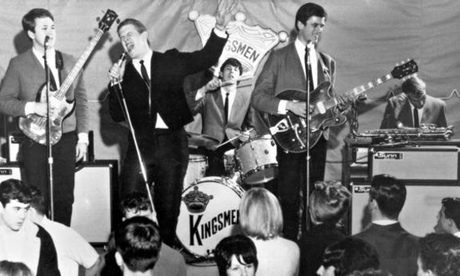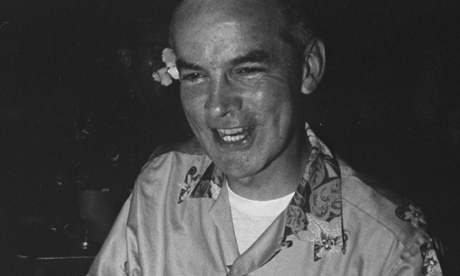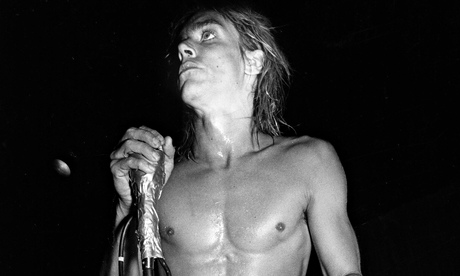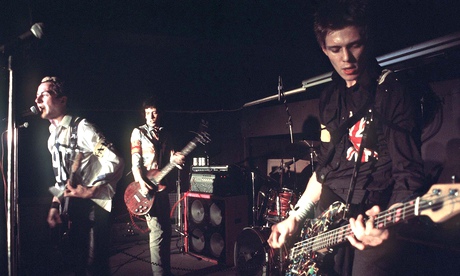Stranger than fiction. The odder than odd story of Louie Louie. Dedicated to my mate Andy whose oldest is named after this song.
_________________________________________________________________________________
Louie Louie: the ultimate rock rebel anthem
Fifty years ago, the governor of Indiana banned the Kingsmen's Louie Louie for being obscene. The FBI then spent two years investigating its lyrics, cementing the song's reputation as rock's ultimate rebel anthem, recorded by everyone from the Stooges to the Clash

Shock, horror: the Kingsmen performing live, possibly singing Louie Louie. Photograph: Michael Ochs Archives
By late 1965, the career of the Kingsmen was fading fast. Their singles were flopping. Their most recent effort, a bit of nonsense called You Got The Gamma Goochee, had struggled to No 122 on the Billboard chart. And no wonder. It sounded like a relic from a bygone era next to the stuff people were actually buying: Like a Rolling Stone or California Girls or My Generation. They'd managed to get a slot in a film called How To Stuff A Wild Bikini, alongside Annette Funicello, but that hadn't worked out so well: the critic from the New York Times had called the movie "the answer to a moron's prayers".
But there was one group of Americans who were still very interested in the Kingsmen: the FBI. One of the band was interviewed by the FBI in September. He informed the Bureau that no, he wasn't – as had been alleged by politicians and outraged parents – a subversive intent on corrupting the country's youth. And no, the incomprehensible lyrics to a single his band had released in 1963 weren't obscene. "It is his belief that only those who want to hear such things can read it into the vocal," noted the official report.
By the time they spoke to the Kingsmen, the FBI must have known the game was up. It had been looking into Louie Louie for nearly two years – playing the single at different speeds, calling witnesses, getting different experts in to try to work out what the hell the Kingsmen were singing – and it hadn't come up with a single solid piece of evidence that the record was obscene. A few months later, the investigation was stopped. One of the most bizarre chapters in American rock history was drawing to a close. There would be echoes of the Louie Louie controversy – looking for things that simply aren't there – for years to come, in everything from the myth that Paul McCartney was dead to the outcry about secret backwards messages hidden on rock albums in the 80s, but nothing quite like it ever happened again.

Governor Welsh
The moral outrage about Louie Louie began in earnest almost exactly 50 years ago, on 21 January 1964, when governor Matthew Welsh of Indiana received a letter from a teenager in the town of Frankfort claiming the song's lyrics were obscene, which led to the record being banned across the state. But the song itself dates back to 1957, when it was written and first recorded by LA R&B singer Richard Berry. The riff was based on El Loco Cha-Cha, a single by Cuban bandleader Rene Touzet, and its gimmick was that its lyrics were written in a cod-Caribbean dialect, which may well have been the cause of all the subsequent misunderstandings and trouble: "See Jamaica, the moon above, it won't be long mi see mi love." Presumably this was an attempt to chime with the contemporary craze for calypso, which had reached such proportions by 1957 that Hollywood produced no less than four calypso-themed films that year. Berry's Louie Louie was a regional hit on the west coast, but it really took root when Berry toured the Pacifc Northwest region, spawning umpteen cover versions by local bands.
The Kingsmen apparently learned it from a 1961 cover by the legendary proto-garage band the Wailers, from Tacoma in Washington, which was credited, for contractual reasons, to their lead vocalist Rockin' Robin Roberts. The Kingsmen's version, taped in their hometown of Portland, Oregon, was recorded in one take, with vocalist Jack Ely straining to be heard over the band's din. Their performance was filled with mistakes and the band hated it: even more so when they discovered that they had to pay for the recording session out of their own pockets. Released as a single in May 1963, it sold nothing until a label called Wand picked it up, at which point it started climbing the Billboard charts. It wasn't just the song's ultra-primitive riff, which bludgeoned its way into your brain through endless repetition: something about the chaos of the Kingsmen's performance seemed to appeal to people. By 14 December, it had reached No 2. Then it started sliding down the charts, leaving the Kingsmen as yet another of the local bands who hit nationally once, before fading into obscurity.
At least, that's what would have happened had it not been for that teenager in Frankfort, Indiana, and his letter. Welsh's secretary, Jack New, sent an aide to buy a copy. "We slowed it down and thought we could hear the words," New told the Indianopolis Star. Billboard reported that the governor's ears "tingled". Welsh then sent a letter to the president of the Indiana Broadcasters Association – who promptly telegrammed his members asking them not to play the record – and set up an investigation. Contacted by the Indianapolis Star, both the Kingsmen and Wand indignantly denied the charge of obscenity. Wand suggested, a little improbably, that persons unknown might have recorded an obscene bootleg version of the track and it was this that reached the governor's ears. The Kingsmen's drummer Lynn Easton insisted: "We took the words from the Richard Berry version and recorded them faithfully – there was no clowning around." The headline read: "Young Singers Dismiss As Hooey Obscenity Charge".
Rather perceptively, the man who headed up the Indianapolis investigation into Louie Louie, a prosecutor called LeRoy New, decided the record was filthy, but its garbled lyrics weren't. He thought there was something undeniably lascivious about the music – he later told the US writer Dave Marsh it was "an abomination of out-of-tune guitars, an overbearing jungle rhythm and clanging cymbals" – but the obscenity laws "just didn't reckon with dirty sounds".
Despite that, the FBI took up the case of Louie Louie in early Feburary, investigating the Kingsmen's single under a law prohibiting interstate transportation of obscene material. The Bureau was doubtless spurred on by a series of letters sent to the US attorney general, Robert Kennedy, from concerned parents across America, who seemed to have got wind of events in Indiana, but not New's conclusion. "Who do you turn to when your daughter brings home pornographic materials?" pleaded one aghast correspondent. "The lyrics are so filthy I cannot enclose them in this letter … We all know there is obscene materials available for those who seek it, but when they start sneaking this material in the guise of the latest teenage rock and roll hit record, these morons have gone too far. This land of ours is headed for an extreme state of moral degradation."
The sheer effort the FBI subsequently expended in attempting to decipher Louie Louie boggles the mind. The investigation went on for more than two years. The subsequent report on the song – unearthed in 1984 by video producer Eric Predoehl – runs for more than 140 pages. The records of the FBI's various attempts to work out the exact kind of obscenities that Louie Louie supposedly contained make for fantastic, demented reading. You can picture agents slowly going nuts as they desperately struggle to pin something, anything, dirty on the lyrics, regardless of whether or not that something makes any sense or actually features in the lyric. "Oh my bed and I lay her there, I meet a rose in her hair," suggested one interpretation. "We'll fuck your girl and by the way," offered another, failing to answer the fairly obvious question this provoked: what, exactly, is by the way? Some of the interpretations were quite lyrical – "Hey Señorita, I'm hot as hell" – although others were not: "Get that broad out of here!"One ad-hoc translator thought it was about masturbation: "Every night and day I play with my thing." Another particularly creative agent seemed to think it centered around the subject of performing cunnilingus on a woman who was menstruating – "She's got a rag on, I'll move above" – which, with the best will in the world, seems a spectacularly improbable topic for any rock band, no matter how raunchy, to be addressing in 1963. Another, more creative still, seems to have actually invented a perversion to fit the garbled vocals: "I felt my bone … ah … in her hair."

Iggy
The question of why the FBI was so convinced that Louie Louie was obscene is an intriguing one. The Kingsmen were exponents of frat rock, garage rock's politer, collegiate older brother. Their sound was raucous, basic and R&B-influenced, but it was party music and the band that made it was utterly harmless. The reason Jack Ely's vocal was so incomprehensible was not out of a desire to insolently sneer and slur his words, but because he'd recently been fitted with braces: months after Louie Louie's release, Ely was ousted by drummer Easton, who proclaimed himself the Kingsmen's leader on the decidedly un-rock'n'roll grounds that his mum had registered the name of the group and was therefore in charge. They were devoid of the Stones-influenced surliness that characterized later garage bands: no hint of the feral menace carried by, say, their fellow Washingtonians the Sonics (whose 1966 version of Louie Louie is a much darker beast than the Kingsmen's version), none of the parent-baiting malevolence of the Standells, gleefully suggesting on their hit Dirty Water that "muggers and thieves" were "cool people".
In fact, the bureau's persistence says less about the Kingsmen than the era in which it took place. Intriguingly, the concerned letters about Louie Louie and the start of the FBI's investigation coincide with the Beatles' arrival in the US: I Want To Hold Your Hand began its seven-week run at No 1 on 7 February, their first appearance on the Ed Sullivan Show – watched by 73 million people and considered a seismic event in US pop culture – came two days later. These days, we tend to think of the moptop-era Beatles as uncomplicated, unthreatening and universally adored, but to a certain kind of reactionary mind, the Beatles were anything but uncomplicated and unthreatening. Their very appearance marked them out as unfathomably strange and alien (in one extreme version of this response, far-right British politician John Tyndall, described the Beatles in 1963 as "effeminate oddities … looking for all the world like the members of some primitive African tribe", before accusing them of ushering an era of "weirdness in the male type"). Furthermore, after several years in which rock'n'roll appeared to have been entirely denuded of its provocative power – its initial rawness streamlined and diluted with parent-friendly intimations of pre-rock pop by Bobby Darin, Paul Anka, Bobby Rydell et al – you only had to look at the reaction the Beatles were getting to know that rock'n'roll was suddenly an incredibly potent force once more. Perhaps the Kingsmen's Louie Louie got caught up in a weird, reactionary undercurrent of confusion and fear, a minor moral panic sparked by the Beatles' arrival that would only grow over the ensuing years, as rock music increasingly started to resemble the revolutionary force its opponents thought it had been from the start. If that's true, then it's faintly ironic, given that the Kingsmen's brand of good-time frat rock was rendered obsolete by the opening chords of I Want To Hold Your Hand.

The Clash
The British Invasion pretty conclusively did for the Kingsmen's career, but their cover of Louie Louie took on a life of its own, becoming not just the definitive version of the song, but a totemic piece of music. You only have to look at the list of artists who covered the song in the 70s and 80s to realise its popularity must be at least partially to do with the controversy and the FBI's investigation, which lent the track a hint of danger, an aura of rebelliousness that its makers never intended it to have: Motörhead, the Stooges, the Flamin' Groovies, the MC5, the Doors, Led Zeppelin, the Clash, Blondie, Patti Smith, Lou Reed, Black Flag.
Matthew Welsh, the man who in effect started the controversy, died in 1995. When Dave Marsh tracked him down a few years before his death, he found him "frustrated that Louie Louie is all he's remembered for", as indeed you might had you ushered in a series of important civil rights bills but people kept talking about the fact you got the lyrics of a pop song wrong. "I thought the whole thing was a tempest in a teapot, and not worth any extended pursuit," he sighed wearily. "I have no interest in it either way." But the myth he helped perpetuate wouldn't go away: 10 years after Welsh's death, a school superintendent in Benton Harbour, Michigan, attempted to stop a middle school marching band performing Louie Louie during the city's Grand Floral Parade on the grounds that the song was obscene.
Then it was gently pointed out to her that story was a myth, and that in any case the band would be playing an instrumental version, and the performance went ahead.
Louie Louie – five from the vaults
The Clash (1980)
You might have expected the Clash to have had a bash at Louie Louie when they were in their infancy. In fact, they saved it till 1980, recording it during sessions for Sandinista. Like Led Zeppelin – who played it in live in 1972 – maybe tackling the song during their pomp was an attempt to keep in touch with their spiky roots.
The Stooges (1974)
You want obscenity? The Stooges have got it. "Got a fine bitch, she's waiting for me/Just a whore, across the way," sings Iggy Pop. And those FBI lyrics about "having her rag on, so I move above"? Iggy uses them. From the live album Metallic KO, described by the critic Lester Bangs as "the only rock album I know where you can actually hear hurled beer bottles breaking against guitar strings".
Toots and the Maytals (1972)
Toots Hibbert took the song back to its Caribbean roots with his ska/rocksteady pioneers, the Maytals. As you might expect, the result sounds less like a teenager's frantic imaginings, and a little more like a seduction. Undoubtedly the least primitive version here.
Black Flag (1981)
Hardcore's defining band offered their own take on Louie Louie on a 7in single, before Henry Rollins had joined. As everyone does, they made up their own words, with LA nihilsm coming to the fore. "Who needs love when you've got a gun?" they ponder. As do we all.
Patti Smith Group (1979)
Always aware of her rock history – here it's paired with a reading of the Velvet Underground's Pale Blue Eyes – Smith, naturally, had to take on such a staple. It's slowed down, it swings. It sounds a whole lot sexier than the Kingsmen, in fact.